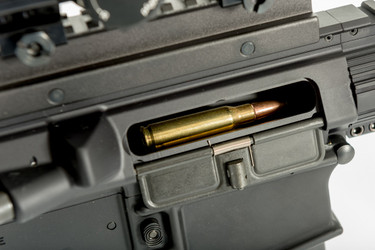What is .223 Wylde?
Posted by 80-Lower.com on Jul 22nd 2024
Whether it's safe to shoot 5.56 NATO in a .223 Remington-chambered rifle has been a longstanding debate, especially in the world of AR-15s (we cover this in detail in our guide: 5.56 vs .223: What's The Difference?). That debate can be laid to rest, now, thanks to the introduction of the .223 Wylde.
What is .223 Wylde?
This is not a new rifle cartridge, but rather a new chamber made to work with both .223 Remington and 5.56 NATO.
How does .223 Wylde work?
The .223 Wylde chamber combines the external dimensions and chamber pressure ratings of the 5.56 NATO's cartridge with the smaller freebore diameter of the .223 Remington's cartridge. The result is a chamber that can safely handle the higher pressure of 5.56 NATO, while also improving its accuracy.
The redesigned freebore of the Wylde chamber also eliminates the lost accuracy suffered when a .223 Remington round is fired from a 5.56 chamber.
Is there any drawback to .223 Wylde?
No. The .223 Wylde chamber is superior to either .223 Remington and 5.56 NATO chambers. Of course, it's perfectly understandable that many rifle owners -- especially AR-15 owners -- prefer running entirely mil-spec components. In this case, there is nothing wrong with sticking to a 5.56 NATO chamber. Remember, it can safely fire .223 Remington with only a minor loss in accuracy.
Why invest in a Wylde chamber?
Ammo prices have risen in recent years, and it's become more difficult to source specific types of ammo from retailers. The .223 Wylde chamber allows any rifle owner to purchase whichever ammo is available at the time -- 5.56 or .223 -- without risking premature wear on their rifle, and without suffering a loss in accuracy or reliability.
How well does Wylde work?
We've got data from the fine folks at www.ammunitiontogo.com. They collected muzzle velocity data by firing 5.56 NATO from a Colt LE9620, and a Pro Firearms 223 Wylde rifle. Both rifles were fitted with 16" barrels and the same gas systems. So, did the Wylde chamber allow NATO rounds to maintain proper (safe) pressures?
55-Grain (M193) Ammo Results
This guide covers M193 and M855 NATO rounds.
223 Wylde Muzzle Velocity:
- Trial #1: 3,013 FPS
- Trial #2: 3,011 FPS
- Trial #3: 3,039 FPS
- Trial #4: 3,046 FPS
- Trial #5: 3,031 FPS
- Average: 3,031 FPS
5.56 NATO Muzzle Velocity:
- Trial #1: 3,033 FPS
- Trial #2: 2,973 FPS
- Trial #3: 2,996 FPS
- Trial #4: 2,999 FPS
- Trial #5: 2,996 FPS
- Average: 2,999 FPS

Comparing averages, we get a 1% difference in muzzle velocity between the two chambers. The graph above shows amazing consistently between each trial run, too. This indicates with no doubt that chamber pressures are just about exact in both guns. The result is a gun that can safely and accurately chamber both 5.56 NATO and .223 Remington, without sacrificing the performance of either.
What about the Wylde barrel itself?
The barrel on any .223 Wylde is no different in construction, rifling, or performance than any other .223 Remington or 5.56 NATO barrel. They use the same alloys, coatings, treatments, gas systems, and twist rates. Only the chamber itself differs slightly between these three sets of specifications.
Is the Wylde chamber compatible with all AR-15 parts?
Yes. Beyond tiny differences in chamber measurements, the .223 Wylde barrel extension is identical to any other .223 Remington or 5.56 NATO chamber. No special parts or modifications are required if you want to install a Wylde barrel on your current .223/5.56 rifle. Barrel nuts, receivers, lower parts, gas system parts, the bolt and carrier, buffers, springs, magazines, and everything else remain the same.
Is there any 5.56 or .223 load the Wylde can't shoot?
No. The .223 Wylde chamber can handle any 5.56 and .223 cartridge of any grain weight and load. That's why investing in this chamber is so great: You can shoot every type of commercial and mil-spec cartridge on the market, minus any risk to reliability and without sacrificing accuracy.
DISCLAIMER: If you are new to the world of DIY gun building, you likely have a lot of questions and rightfully so. It’s an area that has a lot of questions that, without the correct answers, could have some serious implications. At 80-lower.com, we are by no means providing this content on our website to serve as legal advice or legal counsel. We encourage each and every builder to perform their own research around their respective State laws as well as educating themselves on the Federal laws. When performing your own research, please be sure that you are getting your information from a reliable source.

